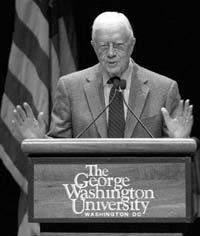|
April 2007
Jimmy Carter Talks Candidly at GW About Middle East Peace
Former President Answers Student Questions for 45 Minutes
By Jamie L. Freedman

Student Jordan Evert; Amb. Edward “Skip” Gnehm, Kuwait Professor of Gulf and Arabian Peninsula Affairs; W. Russell Ramsey, chairman-elect of the Board of Trustees; Former U.S. President Jimmy Carter; President Stephen Joel Trachtenberg; and Board of Trustees Chairman Hon. Charles T. Manatt.
|
Lisner Auditorium was packed to capacity on March 8 for a conversation with former U.S. President Jimmy Carter. Members of the GW community, congressmen, and ambassadors gathered to hear the 39th president of the United States speak about the Middle East and his best-selling book Palestine: Peace Not Apartheid, which has sparked debate since it hit bookstands in November.
The third lecture in the Elliott School of International Affairs’ Middle East Policy Forum, the event was facilitated by Amb. Edward “Skip” Gnehm, B.A. ’66, M.A. ’68, GW’s Kuwait Professor of Gulf and Arabian Peninsula Affairs. Gnehm delivered introductory remarks, along with Amb. Charles T.
Manatt, J.D. ’62, chairman of GW’s Board of Trustees and chairman of the Democratic National Committee during Carter’s presidency. GW President Stephen Joel
Trachtenberg introduced Carter and spoke about the former president’s many accomplishments, both as U.S. president from 1977
to 1981 and as a celebrated humanitarian and statesman over the past quarter of a century.
Acknowledging the crowd’s standing ovation with his characteristic wide grin, Carter opened his remarks by speaking about his personal connection to the University. “Our youngest son Jeffrey attended GW when I was president, and he received the best education in the family,” said Carter. “He majored in computer science and geography at GW, and then went on to create 3-D map software, which he patented and sold for enough money to retire in his early 40s and support many of us!”
 President Jimmy Carter addressed student questions on his book, Iran, and Middle East peace. President Jimmy Carter addressed student questions on his book, Iran, and Middle East peace.
|
The chief architect of the 1978 Camp David Accords and 2002 Nobel Peace Prize winner then turned his attention to the topic of his recent book—the Israeli-Palestinian conflict. Quoting the late Pope John Paul II, Carter began by stating that there are two solutions to the Middle East crisis—
the realistic and the miraculous—defining the latter as a voluntary agreement between the two parties.
“I’ve spent a great deal of my adult life trying to bring peace to Israel and its Arab neighbors with justice and righteousness,” said Carter, who has remained heavily involved in Middle East affairs since leaving the White House. He travels
frequently to the region
with his wife Rosalynn and served as an observer in the Palestinian elections of 1995 and 1996.
Carter summarized the main points of his book and offered an assessment of what must be done to move the Middle East peace process forward. He underscored the urgency of increasing debate on the Israeli-Palestinian conflict and restarting peace talks, which have been stalled for six years. He also defended his use of the term “apartheid” in the book’s title, which he defined as “the forced segregation by one people of another.”
“We need to bring permanent peace to Israel with dignity and justice for Palestinians,” he said, pointing out that his ultimate goal is “a secure Israel living in peace with its Arab neighbors and righteousness for the Palestinians.”
After speaking for half an hour, Carter candidly fielded a variety of questions from GW students—some highly critical of his book. Others ranged from worries about Iran’s current posturing to how to revive the Middle East peace movement. “The best way to resolve these issues is through direct talks,” he affirmed, adding that “early and thorough conversations between Israel and Syria are also crucial.”
In response to another question, Carter said if he had to do it over again, he would write the same book. “It has precipitated a debate in this country that had been completely lacking,” he said.
Send feedback to: bygeorge@gwu.edu
|
|

|

